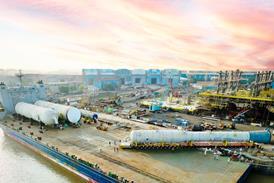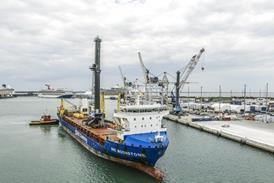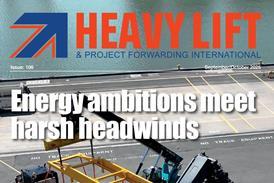Taken from the November/December 2017 edition of HLPFI, Gregory DL Morris investigates the use of distributed ledger technology in the supply chain.
As various sectors of the supply chain study the viability of digitising the complex communications trail and improving efficiency and visibility, the distributed ledger technology known as blockchain is being trialled in a series of individual pilot projects. Some expect there to be benefits for project cargo once some standardisation is settled. Gregory DL Morris investigates.
Early in 2018 an alliance of companies in marine cargo and insurance will go commercial with a blockchain system that is intended to increase transparency, security and efficiency in both the physical movement of goods by sea and its insurance. As the blockchain distributed ledger model lends itself to commerce with a high volume of transactions, it has been of greater interest in container shipping than in project cargo.
There are potential benefits in blockchain for the project cargo segment, but applying what has been a virtual finance system to the world of logistics will take some trial and error. In this case, it may be just as well that operators in project cargo are not first adopters. The early bird may get the worm, but the second mouse gets the cheese.
"About USD30 billion in premiums are collected each year in marine cargo insurance," said Shaun Crawford, global insurance leader at consultancy Ernst & Young (EY). "An enormous amount of data is collected, but not much of it is used for risk management. If it were, risks would be better known and priced. Premiums could be lower, and there would have to be less capital tied up on balance sheets."
To that end, an alliance of companies has been testing blockchain systems through this year. The partners include EY, AP Moller-Maersk, Microsoft, underwriters XL Catlin and MS Amlin, insurance broker WillisTowersWatson (WTW), and data security firm Guardtime. "We started proof of concept tests in April 2017 with about a dozen user cases," said Crawford, "and those have been successful. We go live in the first quarter of 2018. The first focus has been on hull, the second on containers; once those are up and running, other types of marine cargo will be included."
An enormous amount of data is collected, but not much of it is used for risk management.
- Shaun Crawford, EY
"There is a lot of buzz in the container market about blockchain," said Chip Reed, account manager for marine at WTW. "Project cargo has less frequency of transactions, so it is being applied first to the generalised segments. That could be good for the more specialised segments such as project cargo. After all, pioneers have it tough. Settlers reap the benefits. And I do see some definite benefits for project cargo."
One such benefit is security. From their cryptocurrency origins, blockchain distributed ledgers have an advantage when counterparties are little known or trusted. Project shipments are often done between parties on the other side of the planet that may not have worked together before.
Management tool
Another is in the management of large capital projects such as a new refinery or power station. The heavy lift and over- dimensional components are just a few out of perhaps thousands of shipments from hundreds of suppliers. "Some project managers are already using blockchains," said Reed. "In those cases, the project manager would purchase the ledger technology and make it available to the participating companies." In that case, a freight forwarder or ship operator would have to be involved in blockchain, but not have to own or operate its own system.
The Port of Rotterdam started a blockchain "technology field lab" in September 2017, about the same time as the insurance alliance made its announcements. Rotterdam is the largest container port in Europe and is also the continent's largest refining and petrochemical cluster, so it is a major hub for bulk liquid terminals and tankers. Those tend to overshadow the project cargo volume in the port by relative number of shipments and tonnage.
However, three factors make Rotterdam an important project cargo port: the inherent demands of a large refining and petrochemical sector for pressure vessels and other large components; the position at the nexus of rail, road, and river/canal systems from the industrial heartland of Europe; and direct access to the sea without locks.
Project cargo has less frequency of transactions, so it is being applied first to the generalised segments.
- Chip Reed, WTW
"Within container shipping, blockchain technology is extensively used," said Robert Jan Timmers, business manager for breakbulk at the Port of Rotterdam. "In other segments, such as steel and non-ferrous metals, it is also used. There might be a place for blockchain in project cargo, and I believe that will grow. We just have not seen much of it yet."
Unlike many ports in North America and Asia, the Port of Rotterdam is strictly a landlord. It leases land to refineries, chemical plants, warehouses, terminal operators and service providers. It also co-invests with some developers, but does not operate any facilities. As such, the port only participates directly in blockchain transactions that involve port fees and other charges.
"Northwest Europe is a mature industrial market, so there are not so many infrastructure projects," he stated. "One exception is wind parks. There are a lot of tenders going out now and we have a keen interest in those."
Timmers explained that the advent of blockchain in project cargo seems to be coming from the largest projects with numerous shipments, and also from the smaller, more frequent projects. Those lend themselves to the distributed ledger approach more than the one-off medium-sized shipments.
"There is a new monopile terminal within our port," said Timmers. "We also see smaller project shipments consolidated here for the North Sea, as well as extreme heavy lift projects. We have floating cranes from 300 or 400 tonnes up to 1,800 tonnes capacity. So far, blockchain has been taken up faster in the container sector than for project cargoes. That may be because container is more transactional, but also may be because shippers prefer to keep control of their information. The blockchain is secure, but it is also transparent."
There might be a place for blockchain in project cargo, and I believe that will grow. We just have not seen much of it yet.
- Robert Jan Timmers, Port of Rotterdam
Potential
Peter Bouwhuis, president and chief executive of project logistics management firm Xellz, is sanguine about the potential for distributed ledger technology in project cargo. "At this moment there are not really any blockchains being used as far as I know, but all parties I know are investigating. It is best for documentation and authorisation, but will be useful for freight forwarders, ocean carriers, handlers and terminal operations."
Xellz has had an implementation testbed running for several months and "it has worked flawlessly", he stated. "Even in areas that do not do a lot of transactional business, blockchain can be applied for security and stability."
This article is taken from HLPFI's November/December 2017 edition. To you ensure you don't miss any of these articles, click here to find out more about subscribing.










